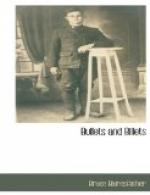They seemed to understand the signs we made; at all events they let us into the place. There was a dairy alongside the house belonging to them, and in here our men were streaming, one after another, paying a few coppers for a drink of milk. The woman serving it out with a ladle into their mess tins was keeping up a flow of comment all the time in Flemish. Nobody except herself understood a word of what she was saying. Hardy people, those dwellers in that cottage. Shrapnel was dropping about here and there in the fields near by, and at any moment might come into the roof of their cottage, or through the flimsy walls.
We four went inside, and into their main room—the kitchen. It was in the same old style which we knew so well. A large square, dark, and dingy room, with one of their popular long stoves sticking out from one wall. Round this stove, drawn up in a wide crescent formation, was a row of chairs with high backs. On each chair sat a man or a woman, dressed in either black or very dark clothes. Nobody spoke, but all were staring into the stove. I wished, momentarily, I had stayed in the lane. It was like breaking in on some weird sect—“Stove Worshippers.” One wouldn’t have been surprised if, suddenly, one member of the party had removed the lid of the stove and thrown in a “grey powder,” or something of the sort. This to be followed by flames leaping high into the air, whilst low-toned monotonous chanting would break out from the assembly. Feast in honour of their god “Shrapnel,” who was “angry.” I suppose I shouldn’t make fun of these people though. It was enough to make them silent and lugubrious, to have all their country and their homes destroyed. We sat around the stove with them, and offered them cigarettes. We talked to each other in English; they sat silently listening and understanding nothing. I am sure they looked upon all armies and soldiers, irrespective of nationality, as a confounded nuisance. I am sure they wished we’d go and fight the matter out somewhere else. And no wonder.
We sat in there for a short time, and stepped out into the road again just in time to hear the order to advance. We hadn’t far to go now. It was quite dark as we turned into a very large flat field at the back of Ypres, right close up against the outskirts of the town. Just the field, I felt sure, that a circus would choose, if visiting that neighbourhood.
The battalion spread itself out over the field and came to the conclusion that this was where it would have to stay for the night. It was all very cold and dark now. We sat about on the great field in our greatcoats and waited for the field kitchens and rations to arrive. As we sat there, just at the back of Ypres, we could hear and see the shells bursting in the city in the darkness. The shelling was getting worse, fires were breaking out in the deserted town, and bright yellow flames shot out here and there against the blackened sky. On the arrival




